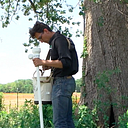HOW TO IDENTIFY OAK TREES IN TEXAS BY THEIR LEAVES: A HANDY GUIDE
Texas is known for its copious oak trees. Did you have any idea that there are more than 50 unique local assortments? They’re profoundly vital to our Southern ecology as indispensable providers of acorns for nourishment to natural life and asylum among their incredible branches. However, how to tell which ones you have out in your yard?
Perhaps the surest method for finding out is looking at an oak tree’s leaves. With three primary leaf sorts of needles, scales, and broadleafs (wide and level), they can tell you far beyond exactly how much raking you’ll need to do when it begins to get cold. Here is a convenient manual for assisting you with identifying your oak trees by their leaves!
Normal Oak Varieties That Grow Best in Texas
- These beauties can reach as high as 90 feet tall with obvious level-bested acorns.
- Their leaves are toothed and light green.
- There are 6 or 7 lobes on each leaf, indented at about the focal point of the leaf.
- Usually have two little points on each side with a pointed tip. However, it’s in no way, shape, or form sharp.
- Reward Tip: Red oaks, generally speaking, normally have pointed lobes, while you’ll find, for the most part, adjusted lobes on white oaks.
Mexican Oak
- The bark of a Mexican oak tree tends to be dim to light dark
- These are semi-evergreen leaves
- They are smooth and somewhere in the range of 2 and 5 inches long
- Shape and shading might shift through the seasons
- Spring brings new foliage of bronze or pinkish shade before changing to a blue-ish green
- Summer sees a downy texture develop
- Normally, its edges are serrated
- These oak tree leaves might stick around on the limbs all through the winter, finally giving way to the new buds sprouting come springtime.
- The top portion of its leaf has a shiny finish of a dim green shade
- The base half is less splendid, with a dim green tone
- Tend to have a calfskin like texture
Lacey Oak
- A Lacey oak, best-case scenario, is of medium-size and, to say the least, the size of a bush.
- Its leaves are thick and elliptical
- It has a wide scope of tones
- Sweet in Spring and Autumn
- Dull blue or dark green in Summer
- He tends to have a couple of shallow lobes
Chinquapin Oak
- Otherwise called a Chinkapin Oak, these trees are exceptionally versatile to various soil conditions.
- You’ll find oval formed leaves that are around 4 to 6 inches long
- They have a coarsely toothed edge
- Basically, it is a dull yellowed green however can turn a huge number of conceals in Autumn from yellow and orange to bronze and brown.
Bramble Oak
- Their acorns have huge cups that essentially wrap the entire oak seed.
- Pod oak leaves are astonishingly huge at as much as a whole foot-long
- They are generally likewise wide with gruff lobes
Post Oak
- Post oak leaves are exceptional with their cross-like shape covered in star-molded ‘hairs.’
- The dull green tone is the highest point of the leaf, while the underside is a lighter yellow.
- Their size is 4 to 7 inches long with a width of 3 to 4 inches
- Frequently, they have five lobes
Water Oak
- While they tend to have a classic oak leaf shape, their sizes can shift significantly.
- In Summer, they have a curbed blue-green to even a hazier green shade
- In Autumn, you’ll find a splendid yellow shade to them
- Their tips have three lobes
Texas Red Oak
- Obviously, there’s a tree specifically called a Texas Oak, and it’s a tough one with the scientific name of Querecus buckleyi.
- This mighty tree is on the more modest to medium side
- Leaves are an excellent mid-tone green that goes to an intense shading in the red family for Autumn
- Its tones can fluctuate between every Autumn and Winter
If you really want assistance determining which kinds of oak trees you have under your care, get in touch with the ISA-certified arborists at TreeNewal and appreciate tailored tree care advice.
